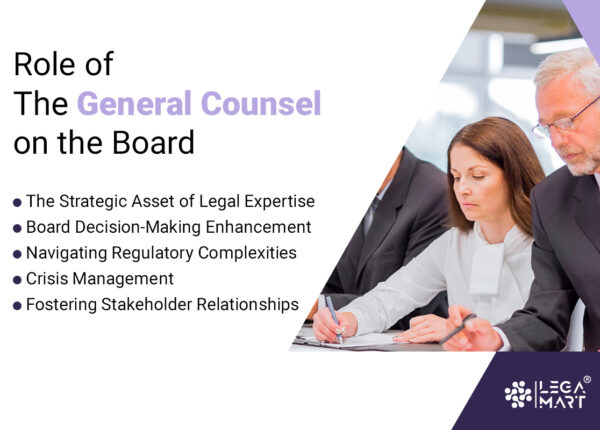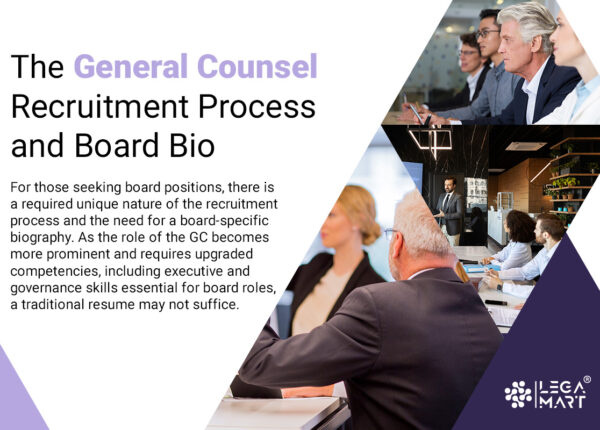Lisa Harrington, with her extensive experience as a Chief Legal Officer (CLO) and board director at Slam Corp and Iron Horse Acquisitions, offers profound insights into the role of General Counsel (GC) in enhancing board effectiveness. Her journey encapsulates the transition from legal expertise to strategic boardroom influence, emphasizing the value of legal leaders in corporate governance and strategic decision-making. Harrington’s insights into transitioning from General Counsel (GC) to board member highlight the value of legal acumen in enhancing board effectiveness. She advocates for legal leaders to embrace the broader strategic responsibilities of board roles, moving beyond traditional legal functions to contribute to corporate strategy and governance. Her experiences underline the importance of being a ‘sponge’ in the boardroom, absorbing and learning from the dynamics and decisions to model effective leadership. This approach not only enriches one’s skill set but also prepares legal leaders for the significant contributions expected of board members, underscoring the strategic asset that legal expertise represents in the boardroom.
In advising legal professionals aspiring to board positions, Harrington emphasizes the importance of networking, building a specialized board bio, and engaging with non-profit and volunteer boards as stepping stones to more prominent roles. Her journey showcases the necessity of a tailored approach to board recruitment, highlighting the distinct skills and value propositions that legal leaders bring to the table. Moreover, Harrington’s reflections on her personal growth and the lessons learned throughout her career offer invaluable guidance for those looking to navigate the path from legal leadership to boardroom influence. Her story is a testament to the evolving role of the GC and the unique contributions they can make towards corporate governance and strategic decision-making at the highest levels.
Introduction
In an era where ambitious medium-sized companies are rapidly growing and thinking about expanding globally, the role of General Counsel (GC) goes beyond just giving legal advice. It becomes crucial in shaping the strategy of the boardroom and making the overall operation more effective. As these companies explore new markets, the GC’s unique position allows them to have a big influence on decisions, ensuring they are not only legally sound but also smart from a strategic standpoint.
Although GCs are increasingly seen as close advisors to CEOs, recent changes and increasing demands highlight the need for them to have a bigger role in corporate governance. In today’s corporate world, GCs are actively working closely with Boards of Directors and board committees. So, exploring the practical relationship between the GC and the board becomes an interesting exploration. This exploration aims to understand how specific aspects of governance affect the role of the General Counsel, showing how their involvement can make a significant contribution to the effectiveness of the board.
The Evolution of the General Counsel’s Role
Over the past few years, there has been a significant shift in the role of General Counsels (GCs) – from being primarily legal advisors to playing strategic roles within the board. This transformation is particularly noteworthy due to issues such as increased availability of technology, changing laws and the dynamic changes in consumer markets. Consequently, GCs have become more actively involved in board meetings and committees, with a rising trend of joining the executive management team. This positions them to interact closely with the board on a regular basis.
Moreover, as companies set their sights on international expansion, GCs are indispensable for navigating intricate legal and regulatory landscapes. Their insights contribute to informed decision-making, alignment with corporate objectives, and adherence to international laws – effectively mitigating potential risks and legal disputes.
Looking ahead, it is anticipated that the role of the GC will continue to evolve in the coming years. The highly regulated environment, coupled with the GC’s collaboration with compliance and risk management, underscores the crucial role of corporate governance. We expect that executive boards will increasingly entrust greater influence and decision-making capabilities to GCs as their role becomes even more strategically significant.
Role of the General Council on the Board

Since the role of general counsel has transformed significantly, they have gone beyond being solely legal advisors within a legal team and are now operating at the intersection of various aspects of a company’s operations. The expansive influence of legal considerations throughout the company provides General Counsels with a comprehensive perspective on the strengths, weaknesses, vulnerabilities, and opportunities of the company. Consequently, General Counsel now play an outward-facing role, interacting with regulators, engaging in the Board, C-Suite, and procurement, among other business units, including:
The Strategic Asset of Legal Expertise
General Counsel actively contribute to shaping business strategy and decision-making. In their capacity as General Counsel, they have gathered comprehensive expertise in the legal and regulatory domains, which is a vital asset for boards operating within intricate legal and regulatory landscapes.
Besides, their legal expertise plays an important role in facilitating cross-border transactions, managing due diligence processes, mergers and acquisition and overseeing negotiations of contracts. This legal proficiency becomes a strategic asset for the company, helping it navigate complex legal landscapes, avoid pitfalls, and smoothly enter new markets hence the need for close collaboration with the board, CEO and executive team.
Generally, having a General Counsel on the board enhances its ability to make well-informed decisions on such matters and provides invaluable support in addressing any legal issues that may arise.
Board Decision-Making Enhancement
The role of a General Counsel involves multifaceted decision-making, with each choice having the potential to impact the organization’s success and reputation. Their decisions significantly contribute to board effectiveness by providing clarity on the legal implications of strategic choices, maintaining governance standards, and nurturing an ethical corporate culture. Involvement in drafting policies and compliance programs is also crucial for promoting transparency and accountability.
Furthermore, as a board member, the General Counsel brings expertise to guide critical commercial decisions, viewing the business from a comprehensive perspective. They adeptly balance risks and regulatory concerns with commercial and market considerations. With their presence on the board, diverse viewpoints are introduced, reducing the risks associated with groupthink and enhancing the decision-making process.
Navigating Regulatory Complexities
General Counsels’ role has become fundamental in equipping the Board to successfully navigate legal and regulatory challenges. The regulatory environment is becoming increasingly complex and dynamic, particularly in the international business which demands GCs’ proactive involvement.
For instance, in the realm of data privacy and cybersecurity, with the proliferation of data breaches and privacy concerns, governments around the world have enacted stringent data protection laws. Similarly, environmental sustainability regulations are becoming increasingly stringent as governments seek to address climate change and promote sustainable practices. Consequently, GCs need to stay proactive, agile, and well-informed of these changes especially in international law and their advocacy in policy discussions are vital for the company’s reputation and compliance.
Simply put, General Counsels must continuously monitor regulatory developments, assess their organization’s compliance posture, and collaborate with the board to develop robust compliance strategies.
Crisis Management
The role of the General Counsel (GC) on the board is particularly crucial during times of crisis, particularly, in developing crisis management plans; as they bring their legal expertise and strategic insights to bear on decision-making processes. In times of crisis, having the GC on the board offers several distinct advantages, for example; the GC’s deep understanding of the organization’s legal landscape enables them to identify potential risks and vulnerabilities early on, allowing the board to take proactive measures to mitigate these risks; the GC’s presence on the board ensures that legal considerations are integrated into strategic discussions and decision-making processes, helping to minimize the organization’s exposure to legal liability.
Moreover, the GC’s role as a trusted advisor to the board fosters open communication and collaboration between the legal department and stakeholders. This ensures that the board is well-informed about legal issues affecting the organization and can make informed decisions in response to crises.
Fostering Stakeholder Relationships
General Counsels (GCs) have a pivotal role in overseeing key relationships with regulators, partners, and customers, ensuring that the company enters into agreements that serve its best interests. This involves not only managing the establishment and upkeep of relationships with these diverse corporate stakeholders but also balancing reporting duties to both the senior management team and the board of directors. In practice, GCs regularly update the CEO on operational matters while adhering to the corporation’s policies to report to the board of directors. By fostering effective communication, GCs cultivate trust and facilitate collaborations essential for the company’s international growth and expansion.
General Counsel’s Non-Legal Skills and Board Service

The role of the general counsel extends far beyond legal skills, requiring them to assume a seat at the board table as strategic business partners. As such, there is a growing emphasis on the importance of non-legal skills for general counsels serving on boards. Some of these non-legal skills include:
Financial Acumen:
Having a general counsel with strong financial acumen on the board is invaluable. They are expected to act as adept business strategists, effectively balancing organizational risk with revenue opportunities while optimizing the value of legal expenditures. A GC with robust financial acumen should be well-versed in the broader economic landscape, comprehend the various legal and regulatory factors impacting businesses, and understand the financial consequences of legal decisions.
Furthermore, this level of understanding requires a solid grasp of fundamental business principles such as accounting, along with proficiency in financial aspects including budgeting and forecasting. A GC with these skills can provide valuable insights into strategic planning and financial management, contributing to the overall success and sustainability of the organization.
Corporate Governance:
The general counsel (GC) plays a pivotal role in corporate governance by leveraging their knowledge of relevant regulatory and legal frameworks to inform decisions. They creatively advise the board on how these guidelines can be utilized to enhance the company’s competitive edge.
Besides, a knowledgeable GC can actively foster and advocate for good corporate governance; and an effective corporate governance entails establishing a system of checks and balances that fosters accountability among the corporation’s management and board of directors.
Strategic Thinking:
Strategic thinking is essential for general counsels (GCs) serving on boards, as it involves considering the company’s long-term objectives and how legal decisions align with broader business goals. Rather than solely focusing on immediate legal matters, GCs must adopt a strategic mindset that encompasses understanding the company’s industry landscape, competitive position, and potential growth opportunities.
On the board, GCs with strong strategic thinking skills can contribute by providing insights into legal implications for various business strategies. They analyze legal risks associated with proposed initiatives, mergers, acquisitions, or expansions, helping the board make informed decisions that align with the company’s strategic direction.
General Counsel’s Legal Expertise as a Boardroom Asset
Legal professionals bring a unique value to the table stemming from handling complexities of corporate governance, compliance, and strategic decision-making. Equally, General Counsel have developed extensive knowledge of legal and regulatory matters, which is crucial for boards dealing with complex legal environments. These skills are particularly crucial in today’s business world, where adhering to regulations and maintaining ethical governance are essential for upholding corporate integrity. Having a General Counsel on the board ensures that the board is better prepared to make informed decisions on these issues and can provide legal support as needed.
Transitioning from Legal Leadership to Board Membership
As a legal leader aspiring to move towards a board membership position, creating a board bio is crucial as well as ensuring your LinkedIn profile is optimized, this can enhance your chances of landing board opportunities. A legal leader can also start by connecting with lawyers and non-lawyers who already serve on boards. They often have access to organizations and connections that may be seeking new board members.
Moreover, you may also consider getting involved in organizations dedicated to advancing and connecting corporate directors and board leaders. Stay updated on emerging business trends and think about how your passion, unique skills, and expertise can benefit a company’s board.
Emphasizing corporate governance experience is also crucial. Operating at the intersection of law and business offers a unique advantage to observe board interactions firsthand. From reporting to attending meetings, legal leaders gain hands-on experience in understanding the complex business issues the board faces.
Harrington emphasizes the importance of being a “sponge” within the boardroom, absorbing the intricacies of effective governance and strategic oversight. This approach not only enhances one’s skill set but also prepares legal leaders for the broader responsibilities and strategic contributions expected of board members.
Serving on a board opens up a legal leader to opportunities to navigate the company’s future from both legal and business perspectives. The key is to leverage areas of expertise to help the board solve complex issues and drive corporate success.
Finding Board Opportunities as a General Counsel
It is important for an aspiring General Counsel who wants to become a board member to begin with volunteering or work with nonprofit boards to gain experience in governance. Serving on nonprofit boards is a valuable step toward understanding governance processes and provides networking opportunities.
Furthermore, advising startup companies is also a great way to gain expertise at the board level. Additionally, acting as an advisor for early-stage companies can help enhance the general counsel’s personal brand, particularly among larger public companies, and may set you apart for advancement to higher levels or executive positions within large corporations.
These roles provide invaluable insights into board operations, fostering skills that are applicable to corporate boardrooms. Networking becomes essential during this transition, with opportunities often arising from professional connections and demonstrated expertise in legal and governance matters.
The General Counsel Recruitment Process and Board Bio

When it comes to choosing and hiring a General Counsel (GC), a question arises as to whether the board should be involved in the process. For those seeking board positions, there is a required unique nature of the recruitment process and the need for a board-specific biography.
As the role of the GC becomes more prominent and requires upgraded competencies, including executive and governance skills essential for board roles, a traditional resume may not suffice. Instead, a board-specific bio serves as a strategic tool, showcasing a candidate’s ability to contribute beyond legal advice by emphasizing their capacity for broad strategic oversight, top-tier leadership skills and risk management. Due to these qualities, it is essential for the chairman and the nominating committee of the board to have a say in the recruitment process. Thus, the recruitment of a GC becomes a joint responsibility of the CEO and the board.
However, the extent of a particular GC’s role and influence will depend not only on their functional expertise, business acumen, and leadership skills, but also to a large extent on their character – specifically, their level of integrity, trustworthiness, and values. These qualities make the GC someone whom board members and top leaders naturally rely on for wise counsel.
Board Membership: A Commitment Beyond Meetings
Being on a board involves more than just showing up to meetings. Harrington’s involvement with boards at companies like Slam Corp and Iron Horse Acquisitions shows the diverse responsibilities board members have. They do not just attend meetings—they also spend time reading through a lot of materials, making important decisions about the company’s direction, and helping with processes like taking the company public. Being on a board means being deeply involved in understanding the company’s strategies, finances, and making sure it follows all the rules and regulations.
Embracing the Board Journey
For legal leaders contemplating board positions, Harrington’s story is both a roadmap and a testament to the value they can add in the boardroom. It highlights the transition from providing legal counsel to contributing to a company’s strategic vision and governance. Legal leaders are uniquely positioned to navigate the complexities of modern business, making them invaluable assets in the boardroom.
Leveraging Board Experience for Strategic Advisory

The general counsel serves as a valuable resource for boards, providing strategic guidance and advice to both the board of directors and the executive team. Through insights gained from an in-depth interview with an experienced GC and board member, it’s evident that GCs transitioning to board roles can utilize their legal expertise to offer broader strategic advisory support, ultimately enhancing board decision-making processes.
It is essential for GCs to leverage their knowledge of relevant regulatory and legal frameworks when advising the board. They creatively counsel on how these guidelines can be applied to maximize the company’s competitive edge, especially in the current landscape of evolving international regulations. The general counsel typically stays updated on regulatory compliance and advises the board accordingly, ensuring the company remains in line with legal obligations and fiduciary responsibilities.
The interview with an experienced GC and board member emphasizes on the significance of understanding board commitments and navigating transitions into and out of board roles gracefully. It also highlights the transformative experience of guiding a company through significant milestones, such as IPOs or acquisitions, from a director’s perspective.
GCs are encouraged to carefully consider their role boundaries, aiming to contribute beyond legal advice. Participating in committees and board decisions presents opportunities for personal growth and strategic influence. Insights shared regarding navigating IPOs and M&A events as a board member underscore the unique strategic value GCs bring, emphasizing their role in risk management, governance, and strategic planning.
Overall, the general counsel plays a vital role in assisting boards with legal compliance in day-to-day operations and supporting strategic planning efforts for future progress and success.
Lesson Learned
In today’s fast-paced and intricately regulated business environment, the transition of legal leaders into boardroom roles underscores a critical evolution. The insightful journey of Lisa Hatton Harrington, a seasoned legal executive and board member, sheds light on the multifaceted role legal professionals play in steering companies towards sustainable growth and compliance.
Conclusion
The role of the general counsel offers numerous advantages to a board of directors. A capable GC is dedicated to assisting both the executive leadership and the board in various capacities. For medium-sized enterprises with ambitions of global expansion, the General Counsel serves as a vital strategic partner. Their role is pivotal in navigating legal intricacies, improving board efficiency, and ensuring that strategic decisions are well-informed, legally compliant, and ethically sound.
As society progresses, the role of the general counsel has evolved to meet the evolving needs of modern organizations. While the responsibilities of GCs have become more complex, attorneys are eager to take on these roles due to the diverse experiences they offer. The transition of General Counsel from mere legal advisors to strategic board members signifies a shift towards a more integrated approach to corporate governance and strategy. This shift is crucial for the success and longevity of enterprises operating in the global marketplace.




